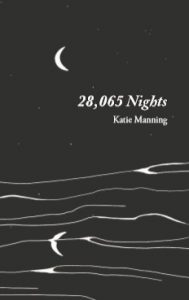

Interview with Katie Manning on her Poetry Chapbook 28,065 Nights
by Eric Van Gorden and Makenzie McGee
In a previous visit with us, you said that “Your Death Explained in Birds” was originally placed at the end of the collection instead of “28,065 Nights.” What gave you the confidence to open your chapbook with such an intense, intimate prose poem that focuses so clearly on the frustration we feel watching our loved ones suffer?
KM: When I first gathered these poems together and started to organize them, I placed this poem last and the title poem first. My colleague and friend Breeann Kyte Kirby suggested that I swap them, and then it felt like everything clicked into place. This poem is really different than the others in the collection, but it works as a doorway into the chapbook’s focus on what we do after we’ve lost our loved ones. I’m so grateful for the way other writers can help us see our own work with fresh eyes.
Each prose poem in 28,065 Nights is inspired by a specific item or memory revolving around your grandmother. I’m sure there are many items that make you think of your grandmother, and many experiences with her that you remember fondly; why did these twenty objects and events strike you enough to write prose poems about them?
KM: I guess the short answer is “I don’t know,” but I’ll expand. In the drafting stage, I just let myself write, so I think these poems capture some of the messy strangeness of grief and memory. Why is grief more intense on some days than others? Why do some objects jog a memory so vividly sometimes, but at other times, they’re just ordinary objects?
Your prose poems in this chapbook are short and include select, specific details, such as mistaking your “uncle’s snore for a bear’s growl,” or “soft mints that look like large teeth.” How do you know which details to include and which to leave out?
KM: What a great question. I don’t have an easy litmus test for which details to include, but I find out through trial and error. I do want poems to contain imagery that can draw readers in and engage their senses, but I don’t want those details to feel cluttered or redundant, and I want the imagery to have its own logic and unity within each poem. I do a lot of work in revision, and I get feedback from trusted writer friends whenever possible to find out what’s working well and what could use more work.
You titled the work 28,065 Nights, and the last prose poem shares that title. 28,065 nights is roughly 77 years – is that how old your grandmother was when she died? Maybe even down to the day? If so, what made you share the exact number of nights your grandmother lived with the reader?
KM: Thank you for making this connection! Yes, the title “28,065 Nights” refers to the number of nights my granny was alive. I wrote that poem in response to a call from NonBinary Review for their 1001 Arabian Nights issue. Since I was already writing the poems in this collection and thinking about how stories connect us and keep us alive, I found it rewarding to write with that call for submissions as a prompt, and that poem felt like a distillation of what I was doing with the project overall. I hadn’t fully articulated what these poems were doing until I wrote that poem.
In “Twenty Years Before You Died,” you mention a deep spiritual fear on behalf of your grandparents, begging God to “…please let my Granny and Grandpa into Heaven,” and even to “…keep them instead of me.” Do you see religious or spiritual undertones affecting your writing, especially about your grandmother?
KM: I don’t think writers can ever escape our identities and experiences. We might try to avoid them sometimes, but they sneak in even when we’re not writing about them directly. As a person of faith who was raised in church, I’m steeped in certain experiences and language (for better and for worse), and that’s going to come out in my poems. In this collection, I didn’t set out to bring in religious or spiritual undertones, but the second poem and the second-to-last poem each examine my son’s and my child-self’s ideas of heaven.
The way you tell your grandmother’s story, with short anecdotes rather than through a traditional memoir or biography, suggests a unique, personal method of remembering the life of your grandmother. What parts of your life with her led you to think these short prose poems were the best way to recount her life and grieve her death? Do you feel that there is more about her that you wish you could say in 28,065 Nights?
KM: After my granny died, I felt an urgency to write down her life story, but I quickly realized that I didn’t have the ability to write out a full account of her life, and what I really wanted to save was my experience of her: the stories she told me and the memories we shared. That was what I most wanted to preserve for myself and pass to my kids. There’s so much more I could write about her and to her, and I might write more, but I came to a place where I hadn’t written a new piece in this sequence for a while, so I decided it was time to finish this chapbook for now and send it out into the world.
Read our book review of 28, 065 Nights (review by Sarah W. Bartlett).
28,065 Nights by Katie Manning
River Glass Books
Makenzie McGee McCracken was born in Nashville, Tennessee in 1999. She grew up as an only child and found solace in the arts. Makenzie is a 2021 graduate of Lee University, having studied both Visual Art and Spanish. She is recently married and working to become a professional ballerina.
Eric Van Gorden was born in Franklin, Tennessee in 2000. He is currently an undergraduate student at Lee University. He is majoring in English with a Writing Emphasis. His work has been published in Whale Road Review.
